Brass instruments are especially susceptible to build-up, as they are constantly exposed to the natural oils from your skin.
Over time, this build-up can cause the instrument to sound dull and muted. Vinegar is a cleaning tool that can help to remove this build-up and restore the brilliance of your trumpet’s sound.
Consider if vinegar is a good material to use for trumpet maintenance.
Here’s How to Clean a Trumpet with Vinegar:
To clean a trumpet with vinegar, mix the same amount of vinegar with warm water. Disassemble your trumpet, and place the various parts in the mixture for a few minutes. Then, remove the parts and let them dry before you put your trumpet back together.
Table of Contents
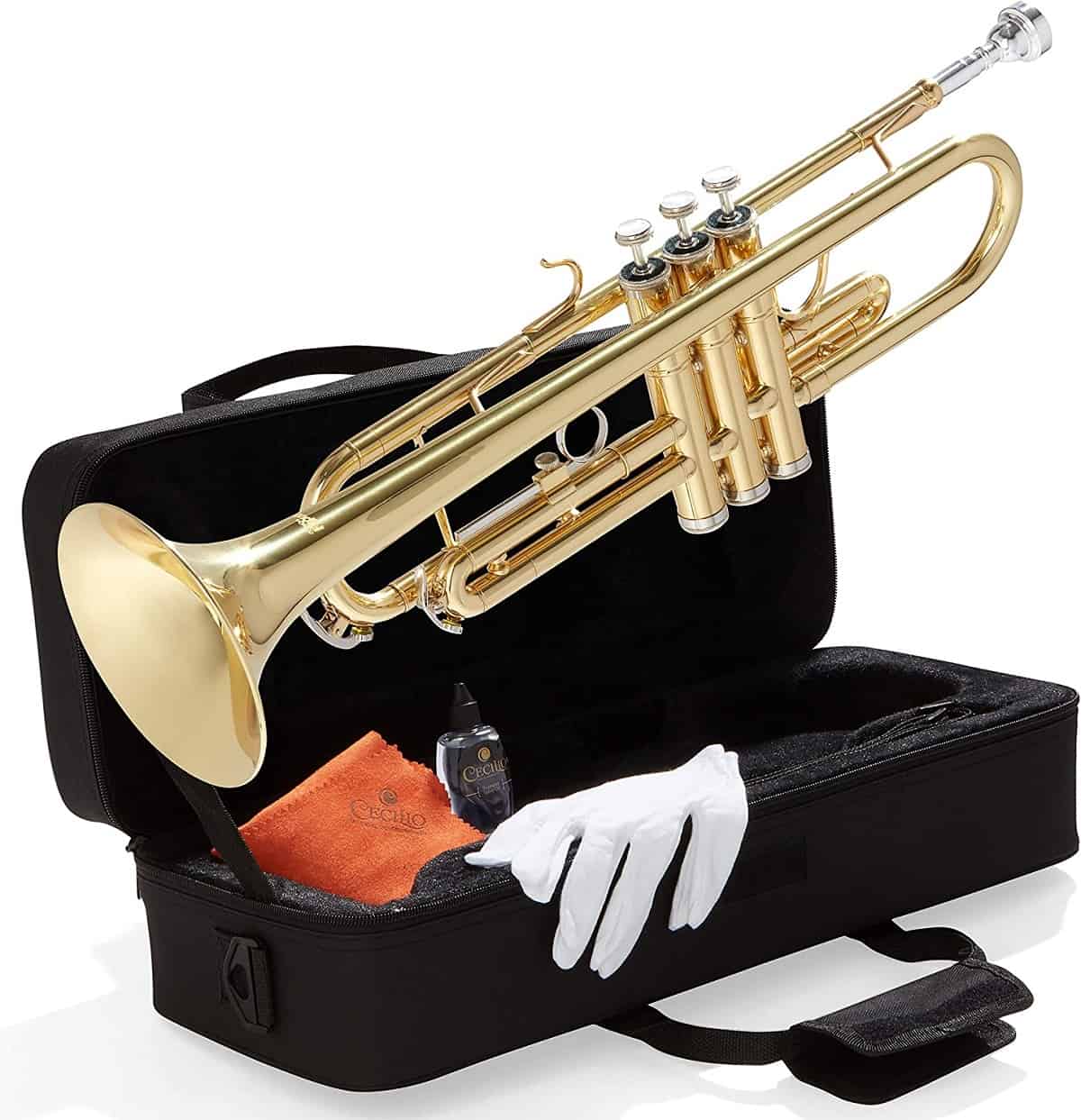
Is It Recommended to Use Vinegar to Clean a Trumpet?
You can use vinegar to clean your trumpet. To do this, combine half a cup of vinegar with a bit of flour and a teaspoon of salt. Mix the ingredients until they turn into a paste.
Put the paste on the brass you want to clean, and let it sit for a few minutes. Use cool water to rinse the paste off and reveal a clean shine.
Of course, this method is best when the outside of your trumpet is dirty. You’ll need to use vinegar or other ingredients to clean the inside of your trumpet.
What Is the Easiest Way to Clean a Trumpet Using Vinegar?
Dipping a cloth in vinegar is the easiest way to clean a trumpet. Then, you can dip the cloth in some salt and rub it over the brass.
If you need to clean the various parts of your trumpet, mix equal parts of hot water and vinegar. Remove the slides, valves, mouthpiece, and bell.
Place all of the parts of the trumpet into the mixture except for the valves. You don’t want the felt parts at the valves to get wet, or else you’ll need a professional to replace the felts.
After giving your trumpet a bath, you can put all the parts back together. Make sure it can play well. You can also take it to a technician if you aren’t comfortable disassembling the trumpet.
Can You Use Vinegar to Clean Trumpet Valves?
You can use vinegar to clean trumpet valves, but you must be careful.
Instead of bathing the valves, mix vinegar with water and wipe down each valve individually.
If you’d prefer to bathe the valves, you’ll need to cover the felts to keep them dry. You can hold the valves so that the felts stay out of the vinegar and water mixture.
However, this method isn’t the best since it requires you to stay with the bath. You can’t just drop the valves in the water and wait for the mixture to work.
Can You Use Vinegar to Clean Mouthpieces?
Vinegar is an excellent ingredient you can use to clean mouthpieces. You’ll need to remove the mouthpiece from the body of your trumpet so that you don’t have to handle the entire instrument.
Pour a bit of vinegar on a soft cloth, then rub the cloth on the mouthpiece to remove any gunk on it. To further clean the mouthpiece, put it in some soap and water.
You can then use more vinegar to remove limescale from the mouthpiece’s surface. For this step, use vinegar with acidity between four and six percent.
Follow that up with soaking the mouthpiece in germicide to get rid of the limescale that’s left over. Then, you can wipe down the mouthpiece to dry it off, and you can polish the mouthpiece to make it look new.
Can Vinegar Damage the Trumpet in Any Way?
If you use vinegar occasionally, it shouldn’t damage your trumpet. However, there can be too much of a good thing, so try not to use vinegar more often than necessary.
Even low levels of acid can weaken the brass over time. That means your trumpet might not be as durable as it could be if you use vinegar too often.
If you need to clean your trumpet frequently, stick to soap and water or simply water. You can still get any dirt off of your instrument, but you can protect it from extensive wear and tear.
Trumpets & Rust? – 7 Things Every Player Should Know
What If Vinegar Doesn’t Remove the Mineral Buildup?
If vinegar doesn’t remove the mineral buildup, consider using germicide to finish the job. You can soak the trumpet parts in germicide or use a cloth to rub it over the spot in question.
Of course, you shouldn’t overuse germicide if you want to keep your trumpet in good condition. If you still have issues getting rid of mineral buildup, take your trumpet to a technician.
A professional will have special equipment to remove the excess buildup. They can also do more than you can at home, and they’ll know how to clean your trumpet without damaging it.
What Are the Best Products for Cleaning a Trumpet?
The best products for cleaning a trumpet are brass or trumpet cleaning supplies. You can use some home remedies, but musical instrument care benefits from specialized equipment.
Many local and online music stores carry trumpet care kits or individual cleaning supplies. That way, you can get the stuff you need to keep your trumpet in good shape.
Here are some specific things to look for when you want to clean your trumpet.
Brass Mouthpiece Brush:
You should have a brass mouthpiece brush to clean the inside of your mouthpiece.
A good brush features soft bristles to help clean the backbore, which can be hard to clean on your own.
The right brush can even stay inside the mouthpiece during storage. That way, prevent dents on the end of the shank, so you don’t have to pay for expensive repairs as often.

Check Out The Current Prices Here!
But you don’t have to keep the brush in the mouthpiece. Make sure to use it after you finish playing to remove any excess spit or condensation so that the inside stays in good shape for the next time you play your trumpet.
Trumpet Bore Snake:
Another excellent cleaning tool is a trumpet bore snake, which can go far into the trumpet.
These snakes can bend to fit through the turns of the instrument.
You can feed the snake into the trumpet from one end using the nylon or cotton end. Push it until you can see it come out through the bell, and you can pull it out.
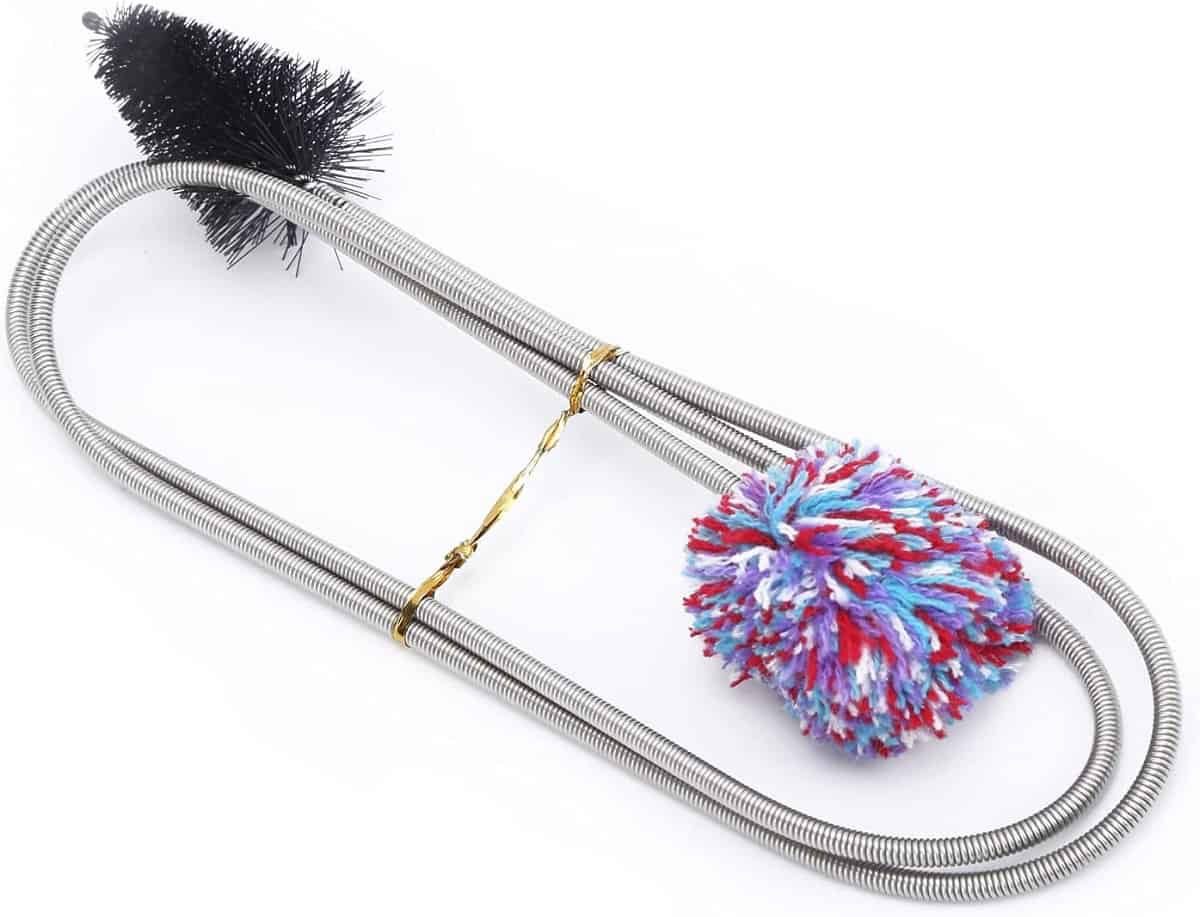
Check Out The Current Prices Here!
Using a trumpet bore snake is especially useful after a long playing session. If you let condensation and spit build up too much, mold could develop and negatively affect the trumpet.
Brass Polishing Cloth:
For the outside of your trumpet, consider using a brass polishing cloth.
Many of these cloths use microfiber, so you don’t have to worry about scratching your instrument.
These cloths are great for removing fingerprints and small amounts of dirt or dust. You can use the cloth all over the outside of the tubing and even at the end of the bell.
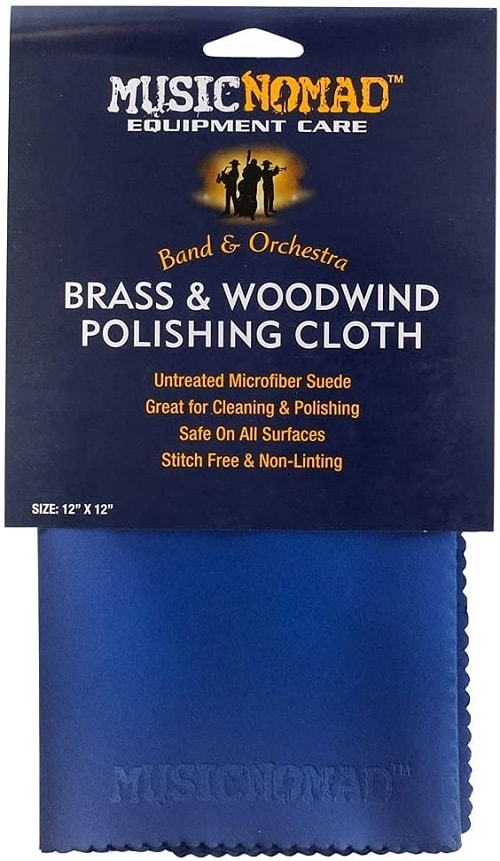
Check Out The Current Prices Here!
If you have a silver trumpet, you can also get a silver polishing cloth to help reduce the risk of tarnishing. But try not to use it too often, or you could do more harm than good.
Trumpet Slide Grease:
If you ever notice your slides are hard to move, consider using some trumpet slide grease.
Do your best to slowly pull the slides out and apply some grease to them.
The grease can help lubricate the slides to make them easier to move in and out. That can help you tune your trumpet more easily, so you don’t have to feel like you need to push or pull the slides too hard.
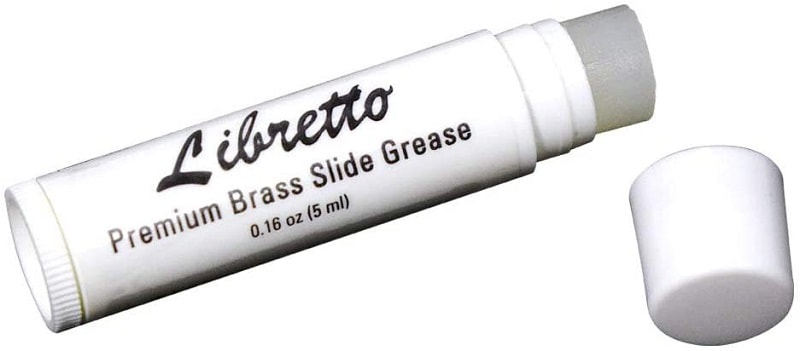
Check Out The Current Prices Here!
If your trumpet slides are stuck, don’t try to remove them yourself. Go to a professional technician and ask them to remove the slides for you.
Then, make using slide grease a part of your trumpet maintenance routine. That can help keep the same thing from happening again.
Disinfecting Spray:
You can also use a disinfecting spray to clean the mouthpiece of your trumpet. This is a nice option if you need to share a trumpet with someone else for whatever reason.
For example, maybe you’re a trumpet teacher with a student struggling with their instrument. You can test it out to see if the trumpet is the problem and use disinfectant on the mouthpiece between players.
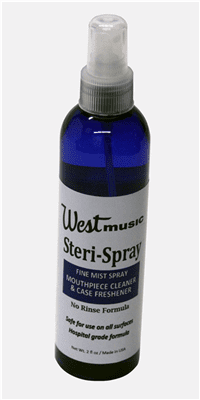
Check Out The Current Prices Here!
Make sure to get a spray that’s specifically for instruments, and avoid using household cleaners.
They might be convenient, but an instrument spray might have a better smell and taste so that you can play the trumpet right away.
Final Thoughts
Vinegar is a common ingredient in many homes, and you can use it to clean your trumpet. Just be careful not to overdo it and to take your trumpet to a professional when you need help.
Sources:
Clean My Instrument: Cleaning Supplies for Trumpets and Cornets
